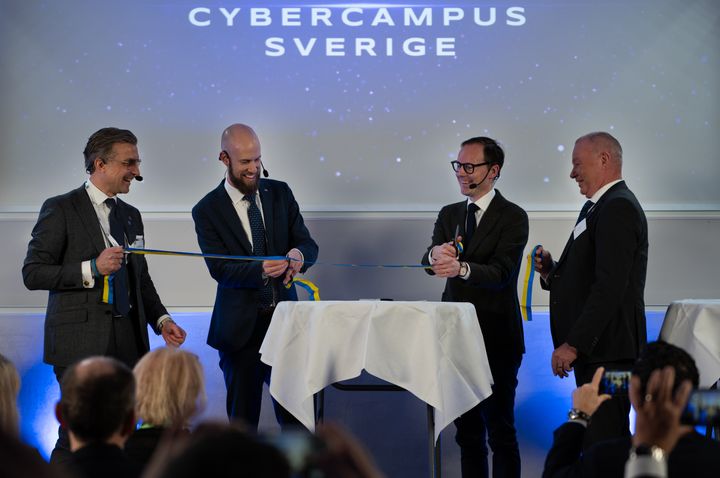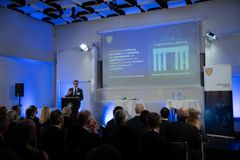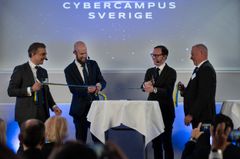Sweden's national cyber security research and education initiative is inaugurated at KTH
With the aim to strengthen its cyber security skills supply and research, Sweden inaugurated its new Cybercampus Sweden yesterday. The national initiative was formally launched in a ceremony at KTH Royal Institute of Technology in Stockholm with Civil Defense Minister Carl-Oskar Bohlin and Education Minister Mats Persson in attendance.

The Swedish government is investing more than 100 million Swedish crowns in the coming years in Cybercampus Sweden, a collaboration between universities, universities of applied sciences, institutes, authorities and companies across Sweden. Cybercampus Sweden aims to enable groundbreaking research, innovation and education for cybersecurity and defense beyond what is possible for individual organizations to achieve.
The initiative will meet needs that are not addressed by any of the other actors in the cybersecurity field, strengthening both society's resilience and Sweden's competitiveness.
David Olgart, director of Cybercampus Sweden, says the initiative will enable Sweden to develop the same skills supply, research and innovation in cyber security as countries such as Switzerland, Germany and France.
“We can now apply the results developed from the planning work, which has been crucial in addressing all the wise views expressed in workshops and meetings with stakeholders from all over Sweden," Olgart says.
Staff recruitment will begin immediately in order to establish Cybercampus Sweden as a national education and research environment. At the same time, work progresses on detailing the roadmap going forward on education and joint research initiatives.
The planning work for Cybercampus Sweden has been led by KTH Royal Institute of Technology, the Research Institutes of Sweden, the Swedish Armed Forces, Karlstad University, Saab, Ericsson and the Swedish Civil Contingencies Agency. More than 150 people from higher education institutions, companies and authorities from all over Sweden participated in the planning work.
“The deteriorating international situation and recent cybersecurity incidents show the importance of having a meeting place where we can share expert advice and have discussions on the complex challenges we face. This is necessary to contribute to a resilient and cybersecure digitalized Sweden. It is therefore important to establish partnerships that ensure access to interdisciplinary skills and resources from all over Sweden," Olgart says.
Images


Subscribe to releases from KTH Royal Institute of Technology
Subscribe to all the latest releases from KTH Royal Institute of Technology by registering your e-mail address below. You can unsubscribe at any time.
Latest releases from KTH Royal Institute of Technology
AI helps decode horses' body language for better veterinary care9.4.2025 12:20:55 CEST | Press Release
Researchers are using AI to bridge the communication gap between horse and human. Combining 3D motion capture and machine learning, a new modeling system would equip veterinarians with a powerful visual tool for interpreting equine body language—the key to detecting physical and even behavioral problems.
New Swedish Initiative to Integrate Research and Healthcare4.4.2025 11:37:56 CEST | Press Release
A groundbreaking national initiative, Precision Omics Initiative Sweden (PROMISE), aims to connect research with healthcare and establish Sweden as a world leader in data-driven precision medicine.
For graphene production, a potential green alternative to mining graphite3.3.2025 14:14:40 CET | Press Release
Researchers in Sweden report a green alternative to reduce reliance on mining graphite, the raw source behind the "wonder material" graphene.
AI on aircraft can help prevent stalls and terrifying drops in altitude17.2.2025 15:58:14 CET | Press Release
Artificial intelligence could help prevent terrifying mid-air drops in altitude. In a new study, an international research team successfully tested a machine learning system for preventing trouble with turbulence.
Alternative to studded winter tires reduces airborne particles by 20 percent6.2.2025 14:41:07 CET | Press Release
On icy roads, studded winter tires can save lives – but they pulverize pavement and fill the air with dangerous, inhalable particles. A new Swedish study shows that both road wear and airborne particles could be reduced by as much as 20 percent if studs were made instead with an alternative hard metal.
In our pressroom you can read all our latest releases, find our press contacts, images, documents and other relevant information about us.
Visit our pressroom